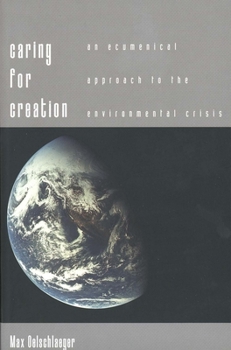Caring for Creation: An Ecumenical Approach to the Environmental Crisis
Select Format
Select Condition 
Book Overview
Many environmentalists believe that religion has been a major contributor to our ecological crisis, for Judeo-Christians have been taught that they have dominion over the earth and so do not consider themselves part of a biotic community. In this book a philosopher of environmental ethics acknowledges that religion may contribute to environmental problems but argues that religion can also play an important role in solving these problems--that religion can provide an ethical context that will help people to become sensitive to the environment and to elect leaders who are genuinely responsive to the ecological crisis. Examining a broad range of Western religious traditions--from conservative Christianity and orthodox Judaism to Goddess feminism and nature religion--Max Oelschlaeger provides a sociolinguistic analysis of their creation stories and finds environmentally positive aspects in each of them. He asserts that religious discourse in the public arena can offer a way for such environmental issues as biodiversity, pollution, and population to be addressed outside the realm of special-interest politics. And he urges local churches to make "caring for creation" a theme for worship in their services; the majority of Americans, says Oelschlaeger, will discover an environmental ethic only through their religious faith.
Format:Paperback
Language:English
ISBN:0300066457
ISBN13:9780300066456
Release Date:February 1996
Publisher:Yale University Press
Length:296 Pages
Weight:1.05 lbs.
Dimensions:0.8" x 6.0" x 9.1"
Customer Reviews
1 rating
So far so good; God's not Dead, he's Green
Published by Thriftbooks.com User , 16 years ago
I'm just starting the book. I'm starting it holding William Greider's The Soul of Capitalism as an important standard, Daniel Quinn's Ishmael, Matthew Fox's Original Blessing, and Jay Haley's Uncommon Therapy as basic points of reference. Eliot Chapple's The Biological Foundations of Individuality and Culture is another of my foundational books. Oelschlager is starting out by referring to the various forms of Judeo-Christian religions' responsibility for the ecological crisis. He is starting to argue that this focus is not the only possible view for this or any religious tradition, and that it is imperative to revise this perspective to address the question of sustainability because of the underlying nature of the religion in the culture. As Matthew Fox was ultimately forced to leave the Catholic Dominican order for his life-affirming revisions of Church Orthodoxy, I would suggest, Oelschlager is suggesting that such a new view of religion is necessary to guide the urgent changes in society. As Greider has explored the financial systems' control panel, and Haley describes the genius of Milton Erickson's psychotherapy, Oelschlager appears to be developing a philosophical analysis of religion's sociocultural functional role extending to the experiential political economy in all our lives, large, small, and personal. More on this later.





